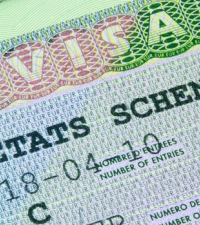What is a Schengen Visa?

If you are a citizen or permanent resident of a country located outside the EU or EEA which does not enjoy visa exemption with the Schengen Area, you will need to obtain a Schengen Visa before traveling to the region. A Schengen Visa allows unlimited travel within the area for a period of up to 90 days within a 6-month period, but cannot be extended. If you plan to visit more than one country within the Schengen Area, you must apply for the Schengen Visa through the embassy or consulate of the country where you plan to spend the most time during your visit.
Which countries are in the Schengen Area
- Austria
- Belgium
- Czech Republic
- Denmark
- Estonia
- Finland
- France
- Germany
- Greece
- Hungary
- Iceland (not in the EU)
- Italy
- Latvia
- Lithuania
- Luxembourg
- Malta
- Netherlands
- Norway (not in the EU)
- Poland
- Portugal
- Slovak Republic
- Slovenia
- Spain
- Sweden
- Switzerland (not in the EU)
Required Documentation:
- Application for a Schengen Visa (PDF)
- Proof of residence within the service area of the embassy or consulate processing the application
- Proof of legal residence within the country where you file your application
- Passport (valid for at least 3 months after your planned visit, and with at least 2 blank visa pages)
- Passport photo
- Parental Authorization for Minors, if applicable
- Proof of employment (including self employment), student, spouse or retiree status
- Proof of sufficient financial support for your entire visit
- Proof of medical insurance
- Round-trip flight itinerary
- Documentation of accommodations for your entire stay
- Letter from personal, family or business sponsor, if applicable
- Visa application fee
Allow sufficient lead time for processing. Depending on your country of citizenship or residency, processing time may vary from a few days to more than a month. However, you may not apply for a Schengen Visa more than three months before your planned departure date.
Long-Term Visitors
There is no uniform Schengen Visa for visits longer than 90 days. If you wish to remain in any country in the region longer than 90 days, you must apply for a residence, work or student visa directly through the embassy or consulate of the country where you wish to settle. However, the Single Permit Directive allows immigrants who are legal residents of an EU country and those who are seeking residence permits to apply for a residence and work permit for that country through a single application process.
Depending on your chosen country and your personal circumstances, you may need to apply for a long-term visa before traveling to the region. However, once you have obtained a long-stay visa for one country within the Schengen Area, you may travel to any of the other countries within the Schengen Area for up to 90 days within a 6-month period without applying for another visa. Once you have resided in one country within the EU continuously for at least five years, you may be eligible to apply for long-term resident status, which carries similar rights as those enjoyed by EU citizens, including access to social services as well as the right to travel and work freely within the EU.
Students
Students who wish to study in one or more countries within the Schengen Area of the EU must obtain residence permits if their course of study is for longer than three months. Visa holders are able to work part-time - at least 10 hours per week. You may also travel to another Schengen Area country within the EU to study in an area related to your original program.
You should be able to bring your immediate family members, including an opposite-sex spouse and dependent minor children. You may be able to bring a same-sex spouse or an unmarried partner, depending on your country of citizenship or residence and the regulations of the country where you wish to study.
Required Documentation:
You will need to provide the following documentation to obtain a residence permit for your period of study. If your program is at least a year long, your residence permit will be for one year. If your program is less than one year long, your permit will be for the length of your program. In both instances, you may renew your permit if circumstances warrant your staying longer.
- Proof of academic program admission
- Evidence of sufficient financial resources to support yourself (and any dependents) during your program
- Passport or other acceptable travel document
- Parental consent (for minors)
- Proof of health insurance, if applicable
- Receipt for residence application fee payment
Family Members
If you hold a residence permit valid for at least one year for a country in the Schengen Area within the EU, you may apply to have your family join you. However, some countries require you to wait two or three years before allowing family members to join you. You must also demonstrate stable and sufficient income to support yourself and your family, along with evidence of health insurance coverage. Once your family members have arrived, they may be eligible to work, attend school or receive work-related training. They may also be eligible to apply for their own long-term residence permits after five years.
Workers
Highly skilled and well-educated workers may pursue a streamlined work permit application process through the Blue Card Directive. Holders of the EU Blue Card enjoy favored status for applications to have family members join them, as well as enhanced freedom of movement to pursue work throughout the EU. Each Blue Card is valid for one to four years, depending on the country of issue and other factors. After 18 months, Blue Card holders may move to another country within the EU. After two years, Blue Card holders hold equal status with citizens and long-term residents of the EU in regard to access to well-paid jobs.
- My Life Abroad -
A selection of expat stories

"A fun compulsive read!"
J. Matcham, Amazon
"I strongly advise people ready to live abroad to read this book!"
Patrice, Amazon

 Global events on real estate markets: are they connected?
Global events on real estate markets: are they connected? Private Tuition: A Priority Among Expat Families for Their Children
Private Tuition: A Priority Among Expat Families for Their Children The Ultimate Guide: Buying Real Estate as an Expat
The Ultimate Guide: Buying Real Estate as an Expat  Basics to Real Estate Investing for the Long Term
Basics to Real Estate Investing for the Long Term